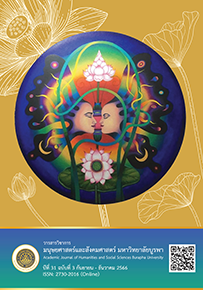Modernism and Truth-seeking in Thai Detective Dramas I Hate You, I Love You and In Family, We Trust
Main Article Content
Abstract
Most detective dramas depict discovering the truth through investigating murder cases in their narratives, both on a character and an audience level. However, it is noted that a few of those shows illustrate the problem of seeking truth in the stories. This essay examined the issues surrounding the pursuit of the truth in the Thai detective dramas I Hate You, I Love You and In Family, We Trust. As a result, these two dramas demonstrated how different people’s points of view might affect how actual a murder case is. The two series depicted the concept of truth-seeking and its relation to Modernism. They also explored related issues, such as the limited point of view of a person when receiving information, the ability of a person to arrange the truth, and the impact of interpersonal relationships on concealing the truth. In other words, these two series exposed the problematic nature of truth and the pursuit of truth in Thai society.
Downloads
Article Details

This work is licensed under a Creative Commons Attribution-NonCommercial-NoDerivatives 4.0 International License.
บทความทุกบทความเป็นลิขสิทธิ์ของวารสารวิชาการมนุษยศาสตร์และสังคมศาสตร์ มหาวิทยาลัยบูรพาเท่านั้น
References
ธงชัย แซ่เจี่ย. (2559). ความจริงที่สูญสลาย: คตินิยมสมัยใหม่ในบันเทิงคดีสืบสวนสอบสวนไทยเรื่อง ภารกิจปริศนาและกาหลมหรทึก. ใน การประชุมวิชาการระดับชาติ มหาวิทยาลัยราชภัฏสวนสุนันทา ครั้งที่ 5 (หน้า 1773-1782). มหาวิทยาลัยราชภัฏสวนสุนันทา.
นาดาว บางกอก. (2559). I Hate You, I Love You [Video]. LINE TV. https://tv.line.me/hateloveseries
นาดาว บางกอก. (2562). เลือดข้นคนจาง [Video]. LINE TV. https://tv.line.me/infamilywetrust
นิโลบล วงศ์ภัทรนนท์. (2564). จากลอดลายมังกรสู่เลือดข้นคนจาง: การนำเสนออัตลักษณ์ทางวัฒนธรรมความเป็นชาวไทยเชื้อสายจีนในละครโทรทัศน์ไทย. วารสารวิชาการมนุษยศาสตร์และสังคมศาสตร์ มหาวิทยาลัยบูรพา, 29(2), 76-103.
บุณยนุช สุขทาพจน์. (2562). แนวคิดทฤษฎีการเล่าเรื่องกับค่านิยมคนไทยเชื้อสายจีนในละครโทรทัศน์ เรื่อง เลือดข้นคนจาง. ใน การประชุมวิชาการและนำเสนอผลงานวิจัยระดับชาติและนานาชาติ ครั้งที่ 10 (หน้า 746-754). มหาวิทยาลัยราชภัฏสวนสุนันทา.
พรธาดา สุวัธนวนิช. (2561). คนรุ่น “ฉัน” ใน I Hate You, I Love You: การบริโภคที่ไร้สุข. https://channel.sac.or.th/th/website/video/detail_news/2973
พลอยไพลิน เมฆพัฒนาภิญโญ. (2563). ภาพรวมระบบกงสีที่ปรากฏในละครโทรทัศน์ เรื่อง เลือดข้นคนจาง. [สารนิพนธ์อักษรศาสตรบัณฑิต, มหาวิทยาลัยศิลปากร].
สรณัฐ ไตลังคะ. (2550). เรื่องสั้นไทยแนวคตินิยมสมัยใหม่ พ.ศ. 2504-2516. [วิทยานิพนธ์อักษรศาสตรดุษฎีบัณฑิต, จุฬาลงกรณ์มหาวิทยาลัย].
สินียา ไกรวิมล. (2545). ลักษณะของบทละครโทรทัศน์ไทยที่ได้รับความนิยมช่วงหลังข่าวจากปี พ.ศ. 2535 ถึง พ.ศ. 2544. [วิทยานิพนธ์นิเทศศาสตรมหาบัณฑิต, จุฬาลงกรณ์มหาวิทยาลัย].
สุรเดช โชติอุดมพันธ์. (2559). ทฤษฎีวรรณคดีวิจารณ์ตะวันตกในคริสต์ศตวรรษที่ 20. จุฬาลงกรณ์มหาวิทยาลัย.
อัญมณี ภักดีมวลชน และคมสัน รัตนะสิมากูล. (2561). การวิเคราะห์โครงสร้างการเล่าเรื่องภาพความรักของวัยรุ่นที่ปรากฏในละครโทรทัศน์ เรื่อง I Hate You, I Love you. วารสารการสื่อสาร มหาวิทยาลัยราชภัฏเชียงราย, 1(2), 43-67.
Bell, J. (1999). What is painting?: Representation and modern art. Thames & Hudson.


